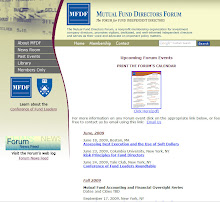K&L Gates' Mark Perlow published an article in the September/October 2008 edition of Practical Compliance & Risk Management for the Securities Industry which posits some of the ways fund advisers might respond to the Seventh Circuit's Jones v. Harris Associates opinion rejecting and criticizing the Gartenberg factors. Foremost, Perlow suggests that advisors should see Jones v. Harris as an opportunity for change:
Harris Associates is an invitation to mutual fund advisers to promote a change in emphasis among the Gartenberg factors. Section 36(b) and Gartenberg reflect an era, long gone, when the mutual fund industry was a much smaller and neglected corner of the financial services industry.Perlow also points out that some of the reasoning behind the Harris Associates opinion is something independent directors realized long ago about the usefulness and role of profitability data in the 15(c) process:
In practice, most independent directors agree with the Harris Associates opinion’s implication that the substantive review of profitability data is a less meaningful exercise than an examination of market fees. The most coherent use towards which profitability data may be put is as an indicator: if an adviser’s profitability has increased meaningfully over some period of time, it is a signal to directors that they should inquire further into the reasons for the change (e.g., realized economies of scale) and subject them to close scrutiny.The piece concludes with some practical advice for advisers and directors as they ponder how to approach the Gartenberg factors in light of Jones v. Harris Associates:
Thus, although mutual fund advisers likely will and should continue to provide information on the Gartenberg factors, they also can emphasize in their presentations and analysis the fees of competing funds over profitability data, and sympathetic boards also can give greater comparative weight to competing fees. Disclosure in the annual report of the board’s deliberations can highlight this factor, and if enough funds do so, it will become industry practice and standard.The entire article is available at: http://www.klgates.com/files/Publication/b333974d-f19d-4c9c-bcb1-03ecd3e25b44/Presentation/PublicationAttachment/b5d8a8b1-68f3-4774-9ae9-08e068ec6d2e/Article_Perlow_Gartenberg.pdf





